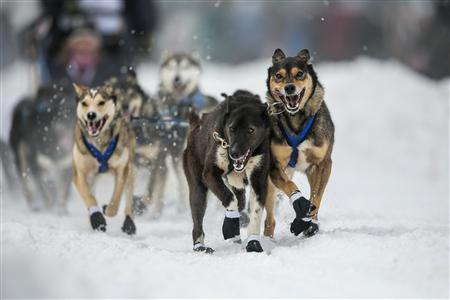(Reuters) – Dogs barked and spectators cheered as 66 mushers and their teams in the 1,000-mile Iditarod race set out from downtown Anchorage on Saturday after religious blessings, singing and glad-handing with fans.
The 11-mile (17-kilometer) first leg ends at a wooded park in the southeast part of the city, in the ceremonial launch of the 41st annual Iditarod Trail Sled Dog Race.
Timed racing will not start until Sunday when the mushers reach Willow, a small community about 80 miles north of Anchorage. The competition will eventually see them glide into Nome, a city on the coast of the Bering Sea.
On Saturday mushers mingled with fans in Alaska’s largest city and reflected on the long road ahead.
Fans serenaded Jamaican musher Newton Marshall, who turned 30 on Saturday, with “Happy Birthday.” A Russian television crew asked him about his decision to leave the sunny Caribbean climate for the snowy Iditarod trail.
“Well, you can’t do it in Jamaica,” Marshall said.
A Catholic priest, a Russian Orthodox priest and a minister from a Korean church blessed the dogs in racer Scott Janssen’s team. Janssen, an Anchorage funeral director, calls himself “The Mushin’ Mortician.”
Four-time champion Martin Buser, the first competitor out of the chute, reminisced about the days when the race clock started in Anchorage and mushers sprinted out of town.
“It used to be wild,” he said. “This is a bit more relaxed, a bit more at ease.”
The Iditarod began with timed competition in Anchorage until the mid-1990s. Back then, the racers rushed to the suburb of Eagle River, where they had to load their dogs into trucks, speed 30 miles up the highway and restart the competition in Wasilla.
Sleds crashed into cars, snowmobiles, people and even trains, Buser recalled. Buser himself once hit a police cruiser with one of his sleds.
STILL SOMETHING AT STAKE
Concerns about safety as development spread to the edges of Anchorage caused race organizers to change the format to the current two-day start.
Even though Saturday’s trot through Anchorage does not count in the race rankings, there was something at stake. The winner will receive $50,400, part of a total race purse of $600,000, and a new truck.
“I suppose, if everything goes right for them, anybody can win,” said 2011 champion John Baker, who holds the race speed record of eight days, 18:46 hours. “I would hope my chances are better than everybody else’s.”
Baker and Buser are in a crowded field of contenders this year. Also in that group is defending champion Dallas Seavey, who at 25 was the youngest Iditarod winner. Last year’s runner-up, New England transplant Aliy Zirkle, could become the first female champion in more than two decades.
Many of this year’s racers have no ambitions for victory.
“My biggest goal is just to finish it. I’m not looking to compete whatsoever,” said Charley Bejna, a race rookie from Addison, Illinois.
Bejna said he hopes someday to move permanently to Alaska, where he has built a cabin. For now, he said, he is maintaining a reverse-snowbird lifestyle, spending winters in Alaska to train with his dogs and summers in Illinois, where he runs a landscaping business that provides the money for him to pursue his dog-mushing dreams.
“Everybody says, ‘Why would you do that?'” Bejna said.
His reply?
“I can’t run dogs in the summertime.”
(Editing by Alex Dobuzinskis and Xavier Briand)

COMMENTS
Please let us know if you're having issues with commenting.